Bach and Telemann – a brief essay in comparison
What a strange bias whereby ‘superficial’ does not signify ‘of vast dimensions’ but rather ‘lacking in depth’ while, on the contrary, ‘deep’ signifies ‘of great depth’ and not ‘of small area’. And yet a feeling like love is measured much better, it seems to me, if it can be measured at all, by its surface area rather than by its degree of depth.
Michel Tournier,
Vendredi ou les limbes du Pacifique, 1969.
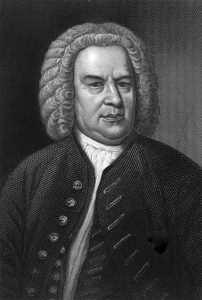
Johann Sebastian Bach
In granting to Johann Sebastian Bach—in his day known as the relatively obscure cantor of the Saint Thomas Church in Leipzig—the glory that his contemporaries attributed to Georg PhilippTelemann—who was lionized throughout Europe—we consider that we, today, have corrected an historic wrong. It gives us pleasure to believe that, in reversing the judgement of the men and women of the 18th century, we righted an historic wrong.
To justify our veneration of the Cantor, we make comparisons—Bach’s profundity versus Telemann’s superficiality, the former’s magisterial
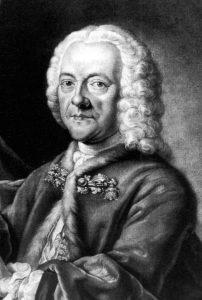
Georg Philipp Telemann
constructions versus the latter’s easy seductions—as if there were always a winner and a loser. The real question is: “Where does this compulsion to draw up hierarchies, one-dimensional classifications, when dealing with artistic creation or esthetic pleasure, come from?” It would not occur to us, today, to compare, say, Raphael with Michelangelo in this way. And as Romain Rolland already wrote, in 1909: “It’s not the case that there is only one correct style per century. Let our hearts be big enough to love all that is beautiful: Pergolesi and Rameau, Beethoven and Rossini.” So let us grant Telemann his due place; there is no need to denigrate this marvellous musician in order to assure lasting glory for Bach.
Both composers—who knew and esteemed each other—had a profound understanding of the instruments, styles, and musical genres of their time. But what emerges from their respective works are two totally different and essentially conflicting concepts of the art of sound. They are both so unique as to be—despite the subtitle of this text—incomparable!
We can begin by noting that both Bach and Telemann followed very similar professional careers; the former’s posts, however, were much less prestigious than the latter’s. Both were more or less self taught; both spent the first half of their lives in various courts and cities of central and northern Germany; and, unlike Handel, neither ever visited Italy, then the Mecca for music and musicians. Both settled down around 1720 and, for the rest of their days, worked for a municipal council—Bach in Leipzig, Telemann in Hamburg—composing, as part of their official duties, cantatas and oratorios. Finally, both made important journeys at an advanced age—Bach to Berlin, Telemann to Paris. The
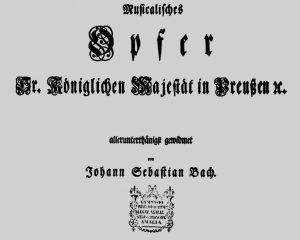
L’Offrande musicale, 1747
works to which these journeys gave rise—Bach’s the Musical Offering and Telemann’s New Paris Quartets clearly differentiate the composers and reveal their profound differences.
Bach is timeless. The last representative of the great contrapuntal school founded by the Franco-Flemish composers of the 15th and 16th centuries, his kingdom, one might say, was not of this world. He lived in his own interior universe, one pervaded by his steadfast faith. He was preoccupied to the point of mania by numerology and symbolism. Though the impact of these ideas on his music is imperceptible to an ordinary listener—God, though, discerns them—he constructed worlds charged with more or less esoteric meaning, recreating the harmony of the spheres, and did so with an
extraordinarily expressive sense of melody. Bach’s vision is cosmic and theological: he aims to unite human beings with God by means of music, by means of the mysterious powers of ars combinatoria. In
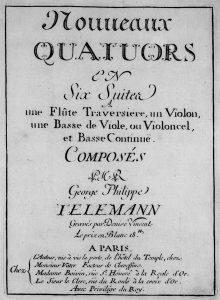
Nouveaux Quatuors, 1738
the first half of the 18th century, when the light of reason was beginning to blaze, the Cantor’s goal and style were becoming ever more obsolete. He watched with mistrust as his sons ventured to write in the nascent Classical style, forms then still untested by time. And, we should add that, as a music teacher, Bach wanted to train specialists, virtuosos, what today we would call professionals. This is the goal of all the didactic masterpieces he wrote for his sons and numerous students.
Telemann, for his part, was very much a man of the world, always enthusiastic, constantly renewing himself. “Until his last days,” according to Gilles Cantagrel, “he remained deeply engaged in active
life and participated in the evolution of contemporary music.” He aimed to please, to seduce, and he succeeded in doing so without being either base or precious. The goal of all his tireless activity was,
by encouraging people to listen to and play music, to bring them together. He was not interested in training specialists. Rather, he targeted competent and discerning amateurs, helping them communicate and converse by means of the art of sound. Bach’s vision was metaphysical, Telemann’s humanistic. While the former contemplated divine mysteries and the elevation of the soul, the latter
encouraged individual expression and collective participation. Telemann certainly wrote a lot—more than Bach and Handel combined—and not everything he wrote was first class. But even his prodigious 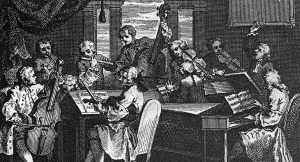 prolificacy is fascinating. Besides, genius is not a fixed quantity that can be exhausted by what some deem as excess production. Can we reproach Telemann’s contemporaries, who invented for us the very idea of happiness, for preferring him above all others?
prolificacy is fascinating. Besides, genius is not a fixed quantity that can be exhausted by what some deem as excess production. Can we reproach Telemann’s contemporaries, who invented for us the very idea of happiness, for preferring him above all others?
To use Carl Gustav Jung’s classification, we can see Bach as an introvert, drawing his vital forces from within, while Telemann, fuelled and stimulated by constant contact with others, insatiably curious, and tirelessly active, is the epitome of an extrovert. How do we assess two personalities so diametrically opposed, yet so complementary in their world views and in what they want to stimulate

Musique au château d’Ismaning, par Peter Jacob Horemans, 1733
us to do? They interact with each other in a kind of dialectic. When it is a question of our pleasure, we can of course have preferences which vary with the time of day or the mood of the moment. But both Bach and Telemann fully lived out their respective destinies; and the musician who relished the honors showered upon him in Paris is, clearly, every bit as essential for music as the Cantor of Saint Thomas, the constructor of cathedrals of sound. Let us conclude with Cantagrel, who deems them both comrades-in-arms, and asks: “Why would one want to unpair two such complementary facets of artistic creation?”
© François Filiatrault, 2024
Translated by Sean McCutcheon
The Bach & Telemann concert will be presented on March 14, 2024 at 7:30pm at Salle de Concert – Conservatoire de Montréal


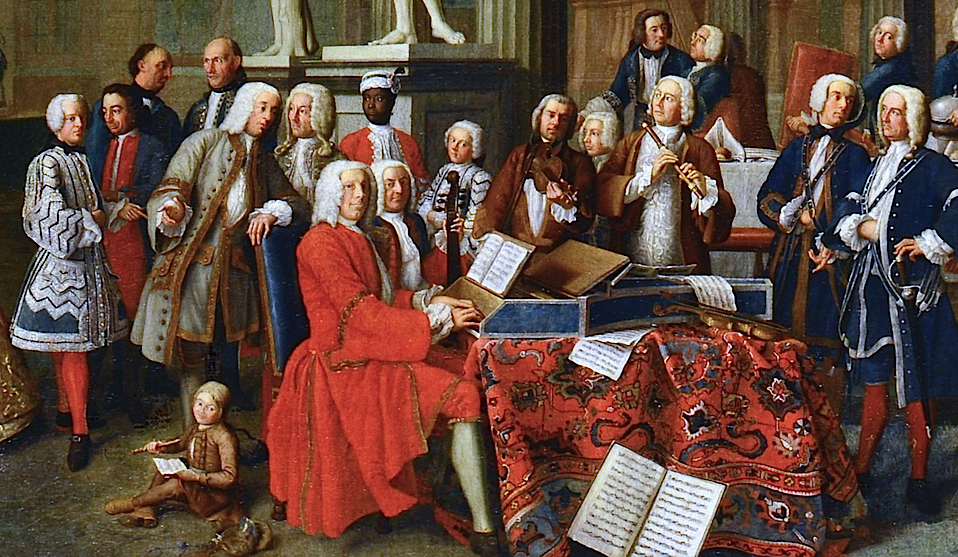

Pingback: Bach et Telemann, petit essai de comparaison - Les Boréades de Montréal